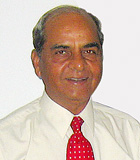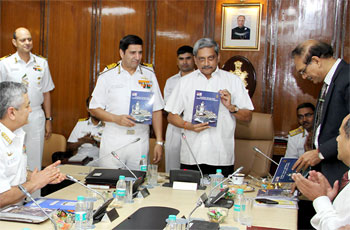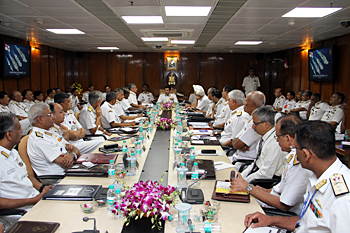INDIAN ARMED FORCES CHIEFS ON
OUR RELENTLESS AND FOCUSED PUBLISHING EFFORTS

SP Guide Publications puts forth a well compiled articulation of issues, pursuits and accomplishments of the Indian Army, over the years

I am confident that SP Guide Publications would continue to inform, inspire and influence.

My compliments to SP Guide Publications for informative and credible reportage on contemporary aerospace issues over the past six decades.
Naval Commanders' Conference - 02/2015
 |
By Rear Admiral Sushil Ramsay (Retd) Senior Editorial Advisor, SP's Naval Forces |


The second edition of bi-annual Naval Commanders' Conference was conducted at New Delhi from October 26 to 28, 2015. Chief of the Naval Staff (CNS), Admiral RK Dhowan chaired the conference and addressed the Navy's top leadership on a host of issues including enhancing operational readiness of the Commands, infrastructure development, human resources management, coastal security, cyber security in the Indian Navy (IN) and foreign cooperation initiatives, amongst others.
The Naval Commanders' deliberated on the key technological enablers for the transformation of IN during the Conference. These deliberations served as a roadmap for the future IN till 2030. Indigenisation, in line with the 'Make in India' initiative of the Honourable Prime Minister, was the key driver for this roadmap. IN has been at the forefront of indigenisation with 47 ships and submarines currently under construction in Indian public and private sector shipyards.
The Naval Commanders delved on numerous initiatives taken by IN to usher in E- governance to provide greater impetus to the IN's integration with the 'Digital India' initiative. While doing so, measures to further strengthen cyber security was examined in detail. With the aim to showcase IN, foster a better understanding of the navies of the world and share best operational practices; the arrangements for the International Fleet Review scheduled at Visakhapatnam in February 2016 was also reviewed.
While inaugurating the Conference on October 26, 2015 the Defence Minister, Shri Manohar Parrikar congratulated men and women of the Indian Navy for discharging their duties with utmost diligence and professionalism. Addressing the Commanders', Shri Parrikar emphasised on the need for continuous vigil and readiness to respond to any contingencies in our areas of interest which required maintaining highest combat readiness of platforms and diligent monitoring of developments in the maritime domain. He assured the Commanders' that the Ministry of Defence was committed to provide the requisite support to IN's quest for planned modernisation activities.
Taking note of the extensive deployments at extended ranges from Indian coasts, spanning from the South China Sea and Sea of Japan in the East to the Persian Gulf and the Atlantic Ocean in the West, he expressed satisfaction at the very high operational tempo maintained by IN.
Shri Parrikar complimented IN's continuous presence and pro-active focussed operations in deterring piracy attempts off the Gulf of Aden which resulted in the recent decision by the Contact Group of Piracy off the Coast of Somalia (CGPCS) to shift the eastern limit of High Risk Area from 78 Degrees East to 65 Degrees East. He complimented IN that there had been no hijacking of Indian owned ship since 2008.
Stressing that 'Make in India' is an important aspect he expressed his pleasure with the impetus being imparted towards indigenous development of naval capabilities and the pace of modernisation programme of IN. He was appreciative of the strides made by the Naval Designers, and urged that the indigenous component in fight category needed to be increased especially in the submarine construction. He also highlighted the issues of capability shortfalls of ship borne helicopters, MCMVs and submarines and assured full support of the Government in addressing these critical gaps.
Addressing the challenges pertaining to human resource development in the Navy, which are unique due to high levels of technical skills required to operate complex, state-of-the-art ships, submarines and deck launched fighter aircraft, Shri Parrikar extended his unstinted support towards improving the quality of life and welfare of our sailors and their next of kin. He congratulated the Navy for designating the current year as the 'Year of the Sailor'.
In response to the prevalent geo-economic and geo-strategic scenarios the IN's role and responsibilities have expanded significantly in the last decade. These developments have necessitated a revision of the IN's strategic guidance document 'Freedom to Use the Seas; India's Maritime Military Strategy' published in 2007. Shri Parrikar released the follow-on edition of IN's strategic guidance document titled 'Ensuring Secure Seas: Indian Maritime Military Strategy'. This edition highlights the incontrovertible link between the seas and India's resurgence in the 21st century.
Emphasising upon India's geographic location and the prevailing security situation which demands continuous vigil and readiness to respond to any contingencies in IN's area of interest, CNS urged the Commanders' to maintain highest combat readiness of platforms and diligent monitoring of developments in the maritime domain. He complimented all ranks in maintaining a high tempo of operations with IN ships deployed at extended ranges from Indian coasts, spanning from the South China Sea and Sea of Japan in the East to the Persian Gulf and the Atlantic Ocean in the West and at the same time remaining focused on maritime and coastal security in close liaison with other national authorities and agencies.
CNS lauded the efforts of IN for focused action in deterring piracy attempts off the Gulf of Aden and closer to India's islands in the Arabian Sea. IN's presence and proactive operations in the area have instilled a sense of confidence in the shipping industry and has been a major contributory factor in the recent decision by CGPCS to shift the eastern limit of High Risk Area.
One of the focus areas discussed during the conference was the induction of manpower, aspects pertaining to training and skill development, and welfare of personnel. Consequent to 2015 being observed as the 'Year of the Sailor', various aspects related to service conditions of sailors and their quality of life (including post retirement placements, accommodation and hospital facilities etc. for them and their next of kin) were deliberated extensively. CNS stated that men and women behind the machine are IN's greatest strength, are greatest asset and their morale and well-being should always remain IN's primary concern.
CNS also reviewed progress of various infrastructure projects that are in the pipeline and shall contribute towards capacity building. The need to adopt sustainable green technologies, re-cycling and waste management to reduce carbon footprint of naval bases, in pursuance of the energy goals of India, as also to have 'zero carbon footprint' were also stressed.
Consolidation and strengthening of the rapidly expanding IN's aviation arm was discussed. Deliberations were also held on infrastructure and manning requirements for new induction aircraft, including Unmanned Aerial Vehicles and enhancement of surveillance in IN's areas of interest.
CNS reviewed the 'coastal security construct' and was satisfied with the steady progress made in strengthening the coastal security apparatus viz. induction of FICs, ISVs and NC3 I project. He asserted the need to remain ever vigilant and focussed towards coastal security responsibilities through proactive coordination with other maritime agencies and coastal states.
CNS also released the revised 'Strategic Guidance to Transformation: A Passage Plan for the 21st Century', a document which identifies the key enablers and tasking for transforming the IN to meet its growing role and operational responsibilities over the coming decades.
In his closing address the CNS complimented all personnel of the Indian Navy for their professionalism and patriotism and exhorted them to prepare themselves and the Navy to meet all future maritime security challenges before the country. Operational consideration should remain collective focus in the coming years. The Navy's role was not only vital for national security, but also for national prosperity and development, he concluded.





